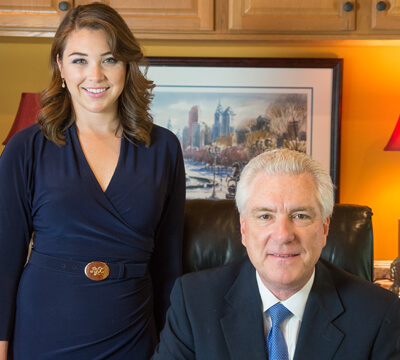DO'S AND DONT'S FOLLOWING AN ACCIDENT
There are some important do's and don'ts accident victims should know about immediately following an accident. Below, John Fox explains some easy things you can do to get your personal injury claim off on the right start.
TAP PLAY ARROW TO WATCH VIDEO: DO'S AND DONT'S IMMEDIATELY FOLLOWING AN ACCIDENT
KEEPING YOUR CASE ON THE RIGHT TRACK
Would you like to make the most out of your personal injury case? A successful personal injury claim is a team effort between you and your attorney. Here are some simple tips for you to keep your case on the right track:
1. Treat your injury immediately, consistently, and as necessary. Your treatment history is weighed heavily in the outcome of your case.
 It is important to treat relatively immediately and consistently following your injury. If you do not treat relatively immediately following your injury, the defense attorney will put into question whether the accident caused your injury. And if you do not treat consistently following your injury, the defense attorney will put the severity of the injury into question. It is also important to treat appropriately for your injury. While you do not want to under-treat, you also do not want to exaggerate your injury, as a doctors have tests to expose exaggerated injury claims, and may note in their records that they believe you are exaggerating your injury claim.
It is important to treat relatively immediately and consistently following your injury. If you do not treat relatively immediately following your injury, the defense attorney will put into question whether the accident caused your injury. And if you do not treat consistently following your injury, the defense attorney will put the severity of the injury into question. It is also important to treat appropriately for your injury. While you do not want to under-treat, you also do not want to exaggerate your injury, as a doctors have tests to expose exaggerated injury claims, and may note in their records that they believe you are exaggerating your injury claim.
2. Keep us informed. Update us with your treatment progress, and inform us when you are finished treating, as well as updates in your contact information. Let us know how your treatment is going or if you're having a problem with your treatment or recovery. We're here to help and have many resources. When you're finished treating, we will aggressively move forward to get you the best compensation possible for your injury. In doing this, we will need to contact you from time to time to make decisions together. It is important that we have updated contact information and are able to contact you.
3. Keep track of your medical providers so we can request all of your medical records when you are finished treating. If we should have to file suit on your behalf, records may be retrieved from as far back as 5 years prior to your accident.
4. What you say to your doctors and therapists is admissible evidence. If you are seeing a psychotherapist and are claiming a brain injury, what you say in your therapy session is admissible evidence. If you are claiming that a brain injury is preventing you from working, but you tell your therapist that you hate your job, that is admissible evidence for the defense. Similarly, if you're not a complainer and tell a doctor or therapist "it's not that bad", and the doctor or therapist notes that in their records, the defense will use that statement against you.
5. Avoid Social Media
Anything you post or write on social media, including direct messages, is admissible.
6. Do not apply for social security disability without first discussing it with your attorney.




